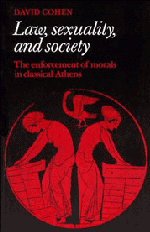Book contents
- Frontmatter
- Contents
- Preface
- 1 Introduction
- 2 Models and methods I
- 3 Models and methods II
- 4 Public and private in classical Athens
- 5 The law of adultery
- 6 Adultery, women, and social control
- 7 Law, social control, and homosexuality in classical Athens
- 8 The prosecution of impiety in Athenian law
- 9 The enforcement of morals
- Bibliography
- Index
7 - Law, social control, and homosexuality in classical Athens
Published online by Cambridge University Press: 03 May 2011
- Frontmatter
- Contents
- Preface
- 1 Introduction
- 2 Models and methods I
- 3 Models and methods II
- 4 Public and private in classical Athens
- 5 The law of adultery
- 6 Adultery, women, and social control
- 7 Law, social control, and homosexuality in classical Athens
- 8 The prosecution of impiety in Athenian law
- 9 The enforcement of morals
- Bibliography
- Index
Summary
The preceding two chapters have investigated the processes of social control associated with male–female sexual relations, particularly adultery. This chapter turns to the area of sexual relations between men, and attempts to show how the politics of reputation and gender also govern this complex field of social practices. Further, the discussion of homoeroticism pursues the theme of the ambiguity, ambivalence, and manipulability of norms, values, expectations, and practices introduced above. Here, Giddens' comment about the centrality of contradiction as a characteristic of social systems can usefully serve as a guiding light for the investigation.
Recent scholarship has succeeded in greatly advancing our understanding of “Greek Homosexuality.” Kenneth Dover and Michel Foucault have argued that the modern dichotomization of sexuality as heterosexuality/homosexuality does not apply to the ancient world, and they have shown how distinctions between active and passive roles in male sexuality defined the contours of the permissible and impermissible in paederastic courtship and other forms of homoerotic behavior. Among the Greeks, we are told, active homosexuality was regarded as perfectly natural: sexual desire was not distinguished according to its object. There was, however, a prohibition against males of any age adopting a submissive role that was unworthy of a free citizen.
Some Athenians in the classical period may have unjudgmentally thought that some men by nature liked boys, others women, still others both, but it does not follow that the normative categories of sexual roles associated with the dichotomy of homosexual/heterosexual were entirely absent.
- Type
- Chapter
- Information
- Law, Sexuality, and SocietyThe Enforcement of Morals in Classical Athens, pp. 171 - 202Publisher: Cambridge University PressPrint publication year: 1991

